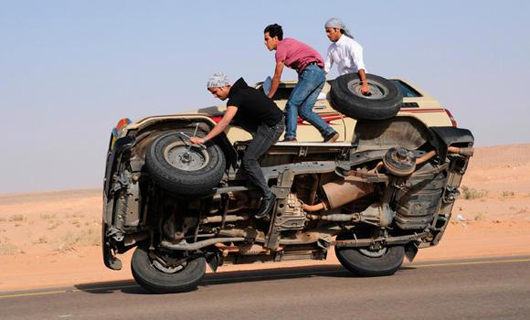Jeddah, May 28: A young Saudi national has died in Qassim after falling from a pickup truck when the driver performed a drifting stunt, according to local media.
This was the first death recorded from drifting since the final examinations started on Sunday, according to the report.
Young Saudis engage in drifting maneuvers during examination periods. “The dead man was traveling in a Hilux pickup vehicle with friends and fell from the vehicle during the drifting stunt and died on the spot,” a source reportedly said.
In a related development, police in Bisha arrested 10 drifters and their accomplices in the city, after receiving a tipoff, while the Jeddah police arrested 60 students for the same offense.
Brig. Gen. Zaid Al-Hamzi, spokesman for the Jeddah traffic department, told Arab News that most were intermediary and secondary level students.
The students were released but had to sign statements that they would have to face legal action after writing their final examinations.
Penalties include having the vehicle confiscated for 15 days and a fine of SR1,000.
For repeat offenders, the punishment could mean imprisonment, the seizure of the vehicle for a month, and a fine of SR1,500.
If a student is caught drifting a third time, the court would definitely imprison him, confiscate the vehicle and fine him SR2,000.
Al-Hamzi said the department is cracking down on the practice.
Traffic patrols have been positioned close to schools to ensure order, including helping students get to their examinations on time.
He said many traffic patrols have been deployed on the city’s roads to ease traffic flow and assist students. “Sometimes students’ vehicles break down on their way to school, and the patrols help them get there quickly,” he said.
Many undercover policemen are operating close to schools, he said.
The department has coordinated its efforts with the education department in Jeddah to prevent students from leaving the school grounds during breaks, said Al-Hamzi.
He said traffic light systems are updated on a regular basis to keep pace with the number of cars on the road at any given time, particularly on main roads.
“Trucks are strictly forbidden from entering cities, traveling on highways and the Al-Khair overpass during peak times because this causes traffic congestion.” Drivers would be punished for failing to comply, he said.






Comments
Add new comment